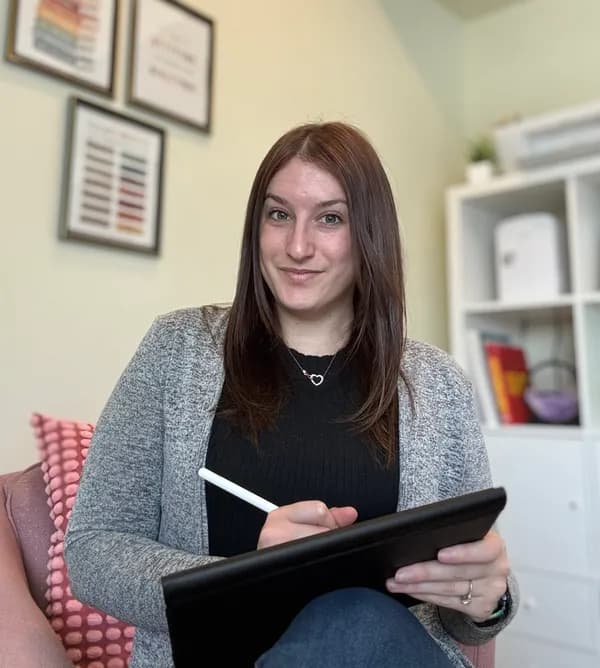Therapy for pet loss and grief

Losing a pet can feel unbearable. They weren’t “just an animal” to you. They were family, your daily companion, the one who greeted you with joy and offered comfort without judgment. Now the house feels painfully quiet. You still glance at their favourite spots, reach to pet them, or expect their sounds before remembering they’re gone. You might be grieving a sudden loss, struggling with guilt after euthanasia, or hurting while caring for an ill or aging pet. This pain is real. The bond you shared mattered, and your grief deserves to be acknowledged and honoured, not minimized.
Understanding grief for companion animals
The human-animal bond
Our relationships with companion animals run deep. Pets offer steady comfort, unconditional affection, structure, and a sense of purpose. For many people, especially those living alone or coping with mental health challenges, pets are primary sources of connection. Research shows that interacting with animals reduces stress, lowers blood pressure, and boosts oxytocin. Your pet wasn’t “just an animal.” They were woven into your daily life and your emotional world. The intensity of your grief reflects the depth of that bond.
Why pet loss grief is dismissed
Pet loss is often a form of disenfranchised grief, meaning society doesn’t fully acknowledge it. People say things like “you can get another one,” workplaces rarely offer bereavement leave, and friends may expect you to move on quickly. This lack of validation leaves many grieving in silence, wondering if their feelings are excessive. They aren’t. Losing a pet disrupts your routines, your sense of home, and your emotional anchor. Your grief is real, significant, and worthy of support.
How common pet loss is
About 60% of Canadian households have at least one pet. With millions of dogs, cats, and other companion animals across the country, most pet owners will face this loss at some point. Research shows that grief after a pet’s death can be as intense as grief after human loss, especially when the pet was a primary companion. Even though this experience is common, support remains limited, leaving many people to navigate deep pain without adequate understanding from others.
Pet loss and grief
Data from Canadian pet ownership and human animal bond reports and pet loss grief research.Humane Canada and Pet loss grief research.
Different types of pet loss
Pet loss shows up in many painful ways. When a pet ages or lives with long term illness, you may grieve long before the end. Euthanasia often brings guilt and doubt even when it was the kindest choice. Sudden death brings shock and no chance to say goodbye. A missing pet creates painful uncertainty with no clear ending. Having to rehome a pet brings grief mixed with guilt and worry about how they are doing now. Each experience is difficult in its own way and all deserve care and compassion.
The impact of losing your companion
Disrupted routines and daily reminders
Pets shape your day through feeding, walks, play, and simple companionship. When they are gone, these routines vanish and the silence is overwhelming. You see their bed, toys, or the spot where they always slept and feel the absence immediately. Even months later, you may still reach for them out of habit. Their loss affects every part of daily life, which is why the grief feels so constant.
Loss of unconditional support
Pets give a type of comfort that feels steady and uncomplicated. They helped calm your anxiety, eased loneliness, and kept you grounded in daily routines. For many people, they were an essential source of emotional support. Losing that presence leaves a deep void and can make existing mental health challenges feel heavier during grief.
Guilt and complicated emotions
Euthanasia often brings painful doubt about timing and whether more could have been done. Even natural death can stir guilt about past choices or moments of impatience. Relief after a long illness can appear alongside grief, and feeling both can feel confusing. If you have other pets, enjoying them may also bring guilt. These mixed emotions are very common and part of the grieving process.
How therapy helps with pet loss
Why specialized support matters
Pet loss grief is real, even if others do not understand it. A therapist who recognizes this will not dismiss your feelings or suggest replacing your pet. They understand the human and animal bond, the weight of euthanasia decisions, and how unacknowledged grief adds to the hurt. Support gives you a space to express your emotions freely, work through guilt or confusion, and honour the importance of your pet. There is no pressure to move on or compare your grief to anyone else’s experience.
Therapeutic approaches for pet loss grief
Grief counselling and validation
Your grief is real and deserves recognition. Therapy helps you understand your reactions, process emotions, and feel validated after hearing dismissive comments from others. A therapist who understands pet loss will acknowledge that losing an animal companion is losing family and that intense grief is a natural response.
Processing guilt and difficult decisions
Euthanasia often brings guilt even when the decision was made with love. Therapy helps you look at what you knew at the time, soften self-blame, and recognize that perfect timing does not exist. You learn to hold space for both love and grief while treating yourself with compassion.
Trauma processing for difficult deaths
Sudden loss or witnessing suffering can leave you with vivid, intrusive memories. Trauma-informed approaches like EMDR help reduce the intensity of these memories so grief is not overshadowed by trauma. This work happens at your pace and only when you feel ready.
Continuing bonds and memorialization
You never have to stop loving your pet. Therapy helps you find meaningful ways to honour them, such as small rituals, keepsakes, or creative memorials. These practices keep your bond alive while helping you adjust to life without their physical presence.
Anticipatory grief support
When a pet is nearing the end of life, grief begins before the loss. Therapy supports you through caregiving stress, difficult decisions, and the emotional weight of saying goodbye. This support helps you cherish remaining time without feeling rushed toward acceptance.
The healing journey after pet loss
Honouring your pet and your grief
Early sessions focus on telling your pet’s story and naming how much they meant to you. You can share photos, memories, and the ways their absence has changed your daily life. Your therapist offers a place where your bond is taken seriously and your grief is treated with respect rather than minimized.
Working through complicated emotions
As you feel ready, therapy helps you process guilt, regret, anger, and the many mixed feelings that often accompany pet loss. You explore difficult decisions, manage triggers, and learn coping strategies for grief waves that feel overwhelming. This work is paced around your comfort and capacity.
Moving forward with love
Over time, the intensity eases while your love remains. Therapy supports you as you rebuild routines, find meaning again, and carry your pet’s memory in a way that feels gentle rather than painful. If you ever consider welcoming another animal, the goal is not replacement but opening space in your life when you feel ready. Both short-term and ongoing support are completely valid.
Find a therapist for pet loss and grief
Choosing the right therapist matters. Each province in Canada has its own regulations, which is why working with a recognized professional can make a real difference in your care. Stellocare takes the uncertainty out of the process by listing only verified therapists you can trust.
The right therapist for you
No therapists found with these specialties in Ontario.
Try selecting a different province.Resources and support
Pet loss support resources
BC Bereavement Helpline – Pet Loss Support
Offers free facilitated pet loss grief support groups for British Columbia residents. Includes virtual sessions open across the province.Visit program.
Ontario Veterinary College Pet Trust – Pet Loss Resources
Provides evidence-based grief guides, coping resources, and referrals for individuals grieving the loss of a companion animal. This service is based at the University of Guelph.Access resources.
Toronto Humane Society – Pet Loss and Grief Resources
Offers a downloadable pet-loss support guide including coping tools, grief education, and lists of additional Canadian services.Download guide.
VCA Canada – Paws to Rest Grief Support
National program offering grief resources, memorial options, and counselling referrals for Canadians experiencing pet loss.Visit Paws to Rest.
Pet-Loss.net – Canadian Support Directory
A curated directory listing pet-loss hotlines, counselling services, and support groups across multiple Canadian provinces.View directory.
Honouring your pet and navigating grief
Creating memorials and rituals
- Establish memorial traditions: light a candle on their birthday or death anniversary, visit their favourite spot, look through photos, or spend quiet time remembering them. These rituals honour your bond and provide structure for grief.
- Create tangible remembrances: make a memory box with their collar, tags, and photos. Plant a tree or garden in their memory. Create artwork or a photo album. Some people get paw print tattoos or keep ashes in special urns. Choose what feels meaningful to you.
- Write to your pet: letters expressing love, regrets, gratitude, or things left unsaid can be deeply cathartic. You don't need to share these with anyone—they're for you and your pet.
Managing guilt and regrets
- Challenge unrealistic expectations: you made decisions with the information and resources available at the time. Hindsight always provides clarity you didn't have in the moment. You did your best with what you knew.
- Focus on the life you gave them: instead of dwelling on the end, remember the years of love, care, and joy you provided. Your pet's entire life matters, not just the final days or moments.
- Recognize euthanasia as compassion: if you chose euthanasia, remember you ended suffering. This was an act of love, not betrayal. The timing is never perfect, but you prioritized their quality of life over your desire to keep them longer.
Caring for yourself and other pets
- Maintain basic routines: even though your pet's routines are gone, maintain your own sleep, eating, and self-care practices. Grief is exhausting; take care of your physical needs.
- Support surviving pets: other animals in your home are likely grieving too. They may search for the deceased pet, act differently, or seem depressed. Maintain their routines, give extra attention, but also give them space to grieve in their own way.
- Be patient about another pet: there's no right timeline for getting another pet. Some people need time; others find comfort in opening their home again quickly. Neither is wrong. When you're ready, remember that a new pet doesn't replace the one who died—they each hold unique places in your heart.
Many websites offer virtual pet memorials where you can create tribute pages. Online forums like r/Petloss on Reddit provide peer support. Facebook groups for pet loss connect you with others who understand. Choose communities that feel supportive rather than triggering.
Questions about pet loss and grief
Am I overreacting by being this upset over a pet?
No. Your pet was family and a steady source of comfort, love, and companionship. The grief you feel reflects how much they meant to you. Research shows that pet loss can be as intense as human loss, especially when the pet was a primary companion. Your grief is real and deserves understanding and support.
When is it okay to get another pet?
There is no right timeline. Some people need time to grieve. Others feel ready sooner and find comfort in caring for another animal. Either choice is valid. Getting another pet does not replace the one you lost. Each animal has their own place in your life. Trust yourself. You will know when it feels right.
My other pet seems depressed. Are they grieving too?
Yes. Animals can grieve the loss of a companion. They may search for them, change their eating or sleeping habits, or seem anxious or withdrawn. Keep routines steady, offer extra comfort, and give them space to adjust. Most pets return to their usual selves within weeks or months. If changes persist, check with your veterinarian to rule out medical causes.
How long will this hurt?
Grief usually eases over time, but missing your pet never fully disappears. Intense pain often softens into quieter waves of sadness, and later into warm memories. Anniversaries and unexpected reminders may still bring tears, even years later. This does not mean you are not healing. It means your bond was deep and meaningful.
Related concerns
References
- Canadian Veterinary Medical Association. Canadian pet population figures. Retrieved from https://www.canadianveterinarians.net/
- Cleary, M., Thapa, D. K., West, S., Westman, M., & Kornhaber, R. (2020). Grieving the loss of a pet: A qualitative systematic review. Death Studies, 46(4), 711-721. Retrieved from https://pubmed.ncbi.nlm.nih.gov/33881389/
- Adrian, J. A., Deliramich, A. N., & Frueh, B. C. (2009). Complicated grief and posttraumatic stress disorder in humans' response to the death of pets/animals. Bulletin of the Menninger Clinic, 73(3), 176-187.
- Packman, W., Carmack, B. J., & Ronen, R. (2012). Therapeutic implications of continuing bonds expressions following the death of a pet. OMEGA-Journal of Death and Dying, 65(4), 335-356.
- Sife, W. (2014). The Loss of a Pet: A Guide to Coping with the Grieving Process When a Pet Dies (4th ed.). Howell Book House.
- Kowalski, G. (1997). Goodbye, Friend: Healing Wisdom for Anyone Who Has Ever Lost a Pet. New World Library.
- Carmack, B. J., & Packman, W. (2011). Veterinary support for bereaved clients. Veterinary Clinics of North America: Small Animal Practice, 41(3), 591-608.
- Wrobel, T. A., & Dye, A. L. (2003). Grieving pet death: Normative, gender, and attachment issues. OMEGA-Journal of Death and Dying, 47(4), 385-393.
About Stellocare
Stellocare is a Canadian platform where you can find the best fit therapist for you. Search the right thperaists now by asking our AI, browsing our list, or finding our social workers for personal referral.

Justin Appler
Registered Psychotherapist (Qualifying) (ON)

Chanté Merriman
Registered Psychotherapist (Qualifying) (ON)

Yamila Luner
Canadian Certified Counsellor

Hardeep Ajmani
Registered Social Worker (ON)

Debra Airth
Registered Therapeutic Counsellor (BC)

Ed Chen
Registered Clinical Counsellor (BC)

Melissa Recine
Registered Psychotherapist (ON)

Alexina Picard
Registered Clinical Counsellor (BC)

Jessica Marshall
Registered Counselling Therapist (NS)

Supriya Verma
Registered Psychotherapist (Qualifying) (ON)

Laura Prikosovich
Registered Social Worker (ON)

Katherine Collins
Registered Psychotherapist (Qualifying) (ON)

Judith Klapak
Counselling Therapist (AB)

Amanda Ross
Registered Social Worker (ON)

Cameron Whatram
Registered Clinical Counsellor (BC)

Christine Griffiths
Registered Psychotherapist (ON)

Shaye Stephenson
Registered Psychotherapist (Qualifying) (ON)

Kellie Thomas
Registered Psychotherapist (ON)

Melodi Laframboise
Registered Psychotherapist (ON)

Alexia Carbone
Registered Psychotherapist (Qualifying) (ON)

Justin Appler
Registered Psychotherapist (Qualifying) (ON)

Chanté Merriman
Registered Psychotherapist (Qualifying) (ON)

Yamila Luner
Canadian Certified Counsellor

Hardeep Ajmani
Registered Social Worker (ON)

Debra Airth
Registered Therapeutic Counsellor (BC)

Ed Chen
Registered Clinical Counsellor (BC)

Melissa Recine
Registered Psychotherapist (ON)

Alexina Picard
Registered Clinical Counsellor (BC)

Jessica Marshall
Registered Counselling Therapist (NS)

Supriya Verma
Registered Psychotherapist (Qualifying) (ON)

Laura Prikosovich
Registered Social Worker (ON)

Katherine Collins
Registered Psychotherapist (Qualifying) (ON)

Judith Klapak
Counselling Therapist (AB)

Amanda Ross
Registered Social Worker (ON)

Cameron Whatram
Registered Clinical Counsellor (BC)

Christine Griffiths
Registered Psychotherapist (ON)

Shaye Stephenson
Registered Psychotherapist (Qualifying) (ON)

Kellie Thomas
Registered Psychotherapist (ON)

Melodi Laframboise
Registered Psychotherapist (ON)

Alexia Carbone
Registered Psychotherapist (Qualifying) (ON)

